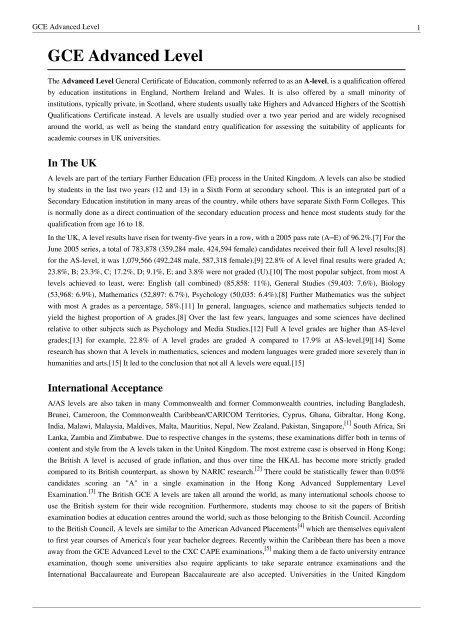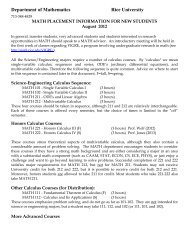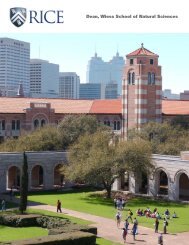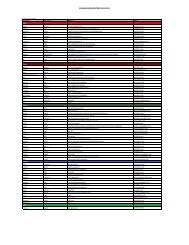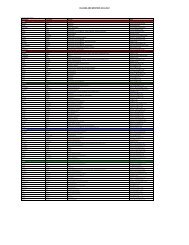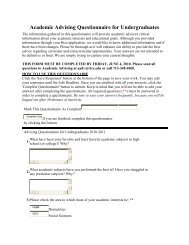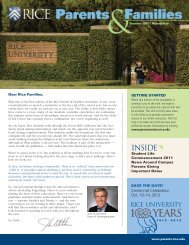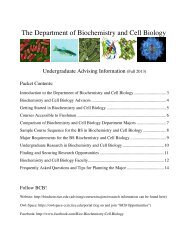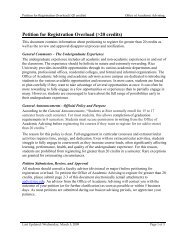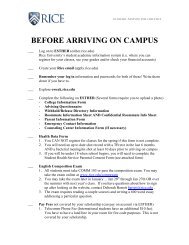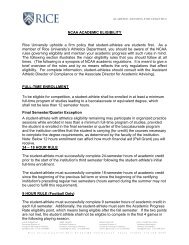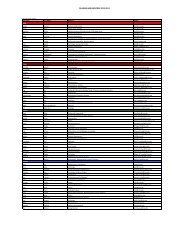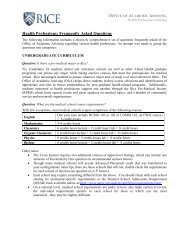GCE Advanced Level - Rice University
GCE Advanced Level - Rice University
GCE Advanced Level - Rice University
You also want an ePaper? Increase the reach of your titles
YUMPU automatically turns print PDFs into web optimized ePapers that Google loves.
<strong>GCE</strong> <strong>Advanced</strong> <strong>Level</strong> 1<br />
<strong>GCE</strong> <strong>Advanced</strong> <strong>Level</strong><br />
The <strong>Advanced</strong> <strong>Level</strong> General Certificate of Education, commonly referred to as an A-level, is a qualification offered<br />
by education institutions in England, Northern Ireland and Wales. It is also offered by a small minority of<br />
institutions, typically private, in Scotland, where students usually take Highers and <strong>Advanced</strong> Highers of the Scottish<br />
Qualifications Certificate instead. A levels are usually studied over a two year period and are widely recognised<br />
around the world, as well as being the standard entry qualification for assessing the suitability of applicants for<br />
academic courses in UK universities.<br />
In The UK<br />
A levels are part of the tertiary Further Education (FE) process in the United Kingdom. A levels can also be studied<br />
by students in the last two years (12 and 13) in a Sixth Form at secondary school. This is an integrated part of a<br />
Secondary Education institution in many areas of the country, while others have separate Sixth Form Colleges. This<br />
is normally done as a direct continuation of the secondary education process and hence most students study for the<br />
qualification from age 16 to 18.<br />
In the UK, A level results have risen for twenty-five years in a row, with a 2005 pass rate (A–E) of 96.2%.[7] For the<br />
June 2005 series, a total of 783,878 (359,284 male, 424,594 female) candidates received their full A level results;[8]<br />
for the AS-level, it was 1,079,566 (492,248 male, 587,318 female).[9] 22.8% of A level final results were graded A;<br />
23.8%, B; 23.3%, C; 17.2%, D; 9.1%, E; and 3.8% were not graded (U).[10] The most popular subject, from most A<br />
levels achieved to least, were: English (all combined) (85,858: 11%), General Studies (59,403: 7.6%), Biology<br />
(53,968: 6.9%), Mathematics (52,897: 6.7%), Psychology (50,035: 6.4%).[8] Further Mathematics was the subject<br />
with most A grades as a percentage, 58%.[11] In general, languages, science and mathematics subjects tended to<br />
yield the highest proportion of A grades.[8] Over the last few years, languages and some sciences have declined<br />
relative to other subjects such as Psychology and Media Studies.[12] Full A level grades are higher than AS-level<br />
grades;[13] for example, 22.8% of A level grades are graded A compared to 17.9% at AS-level.[9][14] Some<br />
research has shown that A levels in mathematics, sciences and modern languages were graded more severely than in<br />
humanities and arts.[15] It led to the conclusion that not all A levels were equal.[15]<br />
International Acceptance<br />
A/AS levels are also taken in many Commonwealth and former Commonwealth countries, including Bangladesh,<br />
Brunei, Cameroon, the Commonwealth Caribbean/CARICOM Territories, Cyprus, Ghana, Gibraltar, Hong Kong,<br />
India, Malawi, Malaysia, Maldives, Malta, Mauritius, Nepal, New Zealand, Pakistan, Singapore, [1] South Africa, Sri<br />
Lanka, Zambia and Zimbabwe. Due to respective changes in the systems, these examinations differ both in terms of<br />
content and style from the A levels taken in the United Kingdom. The most extreme case is observed in Hong Kong;<br />
the British A level is accused of grade inflation, and thus over time the HKAL has become more strictly graded<br />
compared to its British counterpart, as shown by NARIC research. [2] There could be statistically fewer than 0.05%<br />
candidates scoring an "A" in a single examination in the Hong Kong <strong>Advanced</strong> Supplementary <strong>Level</strong><br />
Examination. [3] The British <strong>GCE</strong> A levels are taken all around the world, as many international schools choose to<br />
use the British system for their wide recognition. Furthermore, students may choose to sit the papers of British<br />
examination bodies at education centres around the world, such as those belonging to the British Council. According<br />
to the British Council, A levels are similar to the American <strong>Advanced</strong> Placements [4] which are themselves equivalent<br />
to first year courses of America's four year bachelor degrees. Recently within the Caribbean there has been a move<br />
away from the <strong>GCE</strong> <strong>Advanced</strong> <strong>Level</strong> to the CXC CAPE examinations, [5] making them a de facto university entrance<br />
examination, though some universities also require applicants to take separate entrance examinations and the<br />
International Baccalaureate and European Baccalaureate are also accepted. Universities in the United Kingdom
<strong>GCE</strong> <strong>Advanced</strong> <strong>Level</strong> 2<br />
frequently demand that applicants achieve a minimum set of grades in A level examinations, or the equivalent in<br />
other examination systems, before accepting them. While the government has rejected plans to introduce an English<br />
Baccalaureate [6] modelled on the International Baccalaureate, it has introduced a Welsh Baccalaureate studies in<br />
Wales, based on the French Baccalaureate; but it has yet to be introduced in the rest of the United Kingdom despite<br />
favourable comments by the Welsh Assembly to the British Government.<br />
Studying A levels<br />
The number of A level exams taken by students can vary, though generally not in the state sector in which around<br />
90% of students are educated. A typical route is to study four subjects at AS-level and then drop down to three at A2<br />
level, although some students continue with their fourth subject. Three is usually the minimum number of A levels<br />
required for university entrance, with some universities specifying the need for a fourth AS subject. There is no limit<br />
on the number of A levels one can study (except in Singapore, where students are restricted to 12 "academic units"<br />
and private candidates are also limited in their number of subjects. However, Singapore takes an alternate version of<br />
the A levels that is comparatively more difficult than the international standard.), some students do obtain five or<br />
more A levels. It is permissible to take A levels in languages one already speaks fluently, or courses with<br />
overlapping content. General Studies and Critical Thinking, which require a grasp of basic political ideas and current<br />
affairs in order to write essays rather than specific learning, sometimes augment a student's batch of qualifications.<br />
While many universities do not consider an A level in General Studies to be a stand-alone subject (and thus is not<br />
accepted as part of an offer), it may affect the offer which a student receives. For example, a student of Mathematics,<br />
Physics and Computing might receive an offer of B-B-C for a Physics degree, whereas one also taking General<br />
Studies might receive B-C-C. Unlike A level General Studies, Critical Thinking, which aims to improve student's<br />
analytical skills, has generally received a more positive reception from universities. Often it is given a UCAS tariff<br />
score unlike General Studies and some <strong>University</strong> admissions tutors see it is an advantage when applying for<br />
competitive courses. [7]<br />
The A level has been criticised for providing less breadth since many A level students do not generally study more<br />
than 3 subjects in their final year. [8] A major part of this criticism is that, while a 3 or 4 subject curriculum can be<br />
balanced across the spectrum (e.g., students may choose one science subject, a language subject, and a "creative"<br />
subject like Music), in many cases students choose three closely-linked subjects, for instance, Mathematics, Physics<br />
and Chemistry or Sociology, Psychology and Politics. This is in part due to university entrance requirements, which,<br />
for degree programs such as medicine, may require three related A level subjects. Thus, while the purpose of<br />
Curriculum 2000 was to encourage students to undertake contrasting subjects, to broaden their 'skill-base', there is a<br />
tendency to pursue similar disciplines. However, others disagree, arguing that the additional AS-level(s) studied<br />
would already have provided more breadth compared with the old system. The A levels' breadth also pale in<br />
comparison to the International Baccalaureate, which examines in six subjects, or the European Baccalaureate, which<br />
examines in at least 10 subjects.<br />
Curriculum 2000<br />
Following the introduction of Curriculum 2000 in September 2000 (with the first AS-level examinations held in<br />
Summer 2001 and A2 examinations the following year), an A level now consists of six modules studied over two<br />
years. Normally, three modules are assessed at the end of the first year, and make up a stand-alone qualification<br />
called the "AS-level" (or <strong>Advanced</strong> Subsidiary level, not to be confused with an older AS-level, the <strong>Advanced</strong><br />
Supplementary level). Another three modules are assessed at the end of the second year, which make up the "A2".<br />
A2 modules do not form a qualification in their own right; the satisfactory completion of the AS and A2 modules in<br />
the same subject is required to constitute a complete A level. Modules are assessed by exam papers marked by<br />
national organisations and internally-assessed coursework.
<strong>GCE</strong> <strong>Advanced</strong> <strong>Level</strong> 3<br />
The introduction of the new <strong>GCE</strong> Applied A level suite, taken from the old VCE A levels, generally have a more<br />
vocational twist to them. For example, the new <strong>GCE</strong> A level in Applied Business combines the traditional theory<br />
based subject 'Business Studies' (which can be studied as an A level itself) and adds a more practical and hands-on<br />
approach to it. In this case, for the mandatory modules in the AS year, the candidate is expected to create a simulated<br />
Marketing Proposal (module 1) and Recruitment and motivational package (module 2) as opposed to just studying<br />
the processes. This essentially asks the candidate to show a more thorough insight by actually applying the theory.<br />
Given that many universities have shown a dislike to vocational subjects as opposed to the traditional ones, their<br />
reaction to the new applied suite remains to be seen. However, considering the subject is now much broader and<br />
more 'student-friendly' it is hoped that universities will see that this subject is no less than the traditional Business<br />
Studies given that the traditional aspect of the subject is not fully lost. The new <strong>GCE</strong> Applied A levels are available<br />
in: Art and Design; ICT; Business and Science.<br />
Examination boards<br />
A level examinations are administered through a series of examination boards. These were originally based on the<br />
major UK universities but have over the last 50 years merged into six very large organisations, AQA, OCR, Edexcel,<br />
WJEC and CCEA. Some of these boards also offer A levels to international students especially Edexcel. Another<br />
large organization which offers <strong>GCE</strong> qualifications for international students only is CIE. OCR and CIE are both<br />
branches of the parent organization, Cambridge Assessment. In the UK it is customary for schools to register with<br />
multiple examination boards and to 'mix and match' A levels to get a combined curriculum that fits the school<br />
profile.<br />
A levels in British university admissions<br />
Because A level students often apply to universities before they have taken their final exams, British universities<br />
(including Scottish universities, which receive many applicants taking A levels) consider predicted A level results<br />
when deciding whether applicants should be offered places. The predictions are made by students' teachers and can<br />
be unreliable. Thus, the acceptance of a student onto a course will normally be conditional on him or her actually<br />
achieving a minimum set of grades (for example, conditional offer of three A levels at grades B-B-C). Universities<br />
may specify which subjects they wish these grades to be in (for example, conditional offer of grades A-A-B with a<br />
grade A in Mathematics). A level grades are also sometimes converted into numerical scores, notably through the<br />
UCAS university admission system. [9] For example, under the UCAS system, an A* grade at A level is worth 140<br />
points, while an A is worth 120, a B is worth 100, a C is worth 80, a D is 60, and a E is worth 40; so a university may<br />
instead demand that an applicant achieve 280 points, instead of the equivalent offer of B-B-C. This allows greater<br />
flexibility to students, as 280 points could also, for example, be achieved through the combination A-B-D, which<br />
would not have met the requirements of a B-B-C offer because of the D grade. Or even a combination which is made<br />
up of more than 3 subjects (typically 4 or 5) but with lower grades. The points system also allows for non-academic<br />
input, such as higher level music grades or a Key Skills course.<br />
Criticisms and reform<br />
There have been many criticisms about A levels. One issue widely discussed in the UK is the steady rise in grades<br />
[10] [11]<br />
for 27 years in a row, in particular whether this implies that the A level has been getting consistently easier.<br />
The government and teaching bodies maintain that the improved grades represent higher levels of achievement due<br />
to improved and more experienced teaching methods, [12] [13] but many educationalists and elements of the popular<br />
press argue that the change is due to grade inflation and the examinations getting easier. [14] A third view is that, as<br />
schools come under increasing pressure to improve their examination results, pupils are being coached to pass<br />
specific examinations, at the expense of a general understanding of their subjects. [15] Still another view is that, as the<br />
cost to an examination board of changing a subject's syllabus is very high, they are reluctant to do so, leading to a
<strong>GCE</strong> <strong>Advanced</strong> <strong>Level</strong> 4<br />
lengthy period over which exam questions will inevitably be very similar and so teaching towards their likely content<br />
will be more successful. Yet another view is that, because of the new changes introduced in Curriculum 2000, where<br />
students are examined in both years of sixth form, less academically able students drop subjects they find difficult<br />
resulting in better candidate self-selection and enabling students achieving less than desired grades to retake specific<br />
modules. [15] The ability of unlimited resits, with the best mark going through, has improved results. [16] According to<br />
[17] [18] [19]<br />
some, students selecting "easier" subjects instead of "harder" ones have also contributed to this rise.<br />
Universities in Britain have constantly complained that the increasing number of A grades awarded makes it hard to<br />
distinguish between students at the upper end of the ability spectrum. [20] The C grade was originally intended to<br />
represent the average ability, and students typically required 60% or higher across all assessments to attain it;<br />
however, the average result is now at the lower end of the B grade. Thus, many universities now have their own<br />
entrance tests such as the BMAT and LNAT for specific courses or interviews to distinguish between applicants. In<br />
2005, the head of admissions at the <strong>University</strong> of Cambridge outlined changes [21] he believed should be made to the<br />
current system, particularly the use of the <strong>Advanced</strong> Extension Awards, a top-up qualification that tests the<br />
most-able students some of the harder content in their A level courses. More universities have wanted to see<br />
applicants' individual module results to see how comfortably they have achieved their result. [22] There are fears that<br />
the A level may not offer an accurate test of ability, [23] nor will it be a good prediction of future academic<br />
success. [24]<br />
Concern over A level grading became national news in September 2002. The Observer newspaper ran a story<br />
making claims that A level results had been fixed. It was alleged that students had been given lower marks than they<br />
deserved in order to fix overall results, making the pass rate seem lower than it really should have been and so<br />
disproving that A levels were becoming too easy. This resulted in the Tomlinson Inquiry. As a result, some papers<br />
were re-marked but only 1,220 A level and 733 AS-level students saw an improvement to their results. [25]<br />
In response to concerns shown by employers and universities that it is not possible to distinguish between the large<br />
number of students achieving A grades, and in order to mirror the current GCSE standards, a debate arose in 2004 as<br />
to whether a new, higher "super A" grade (like the A* grade at GCSE) should be attainable. [26] As will be seen in<br />
2010, it was generally agreed that bringing in higher grades would be a much better idea than raising the grade<br />
boundaries to keep the standards consistent, and it has been proposed that on top of the A*, an A** grade should be<br />
attainable at A level in order to stretch the most able students while still allowing others to achieve the grades they<br />
deserve. The <strong>Advanced</strong> Extension Award has been increasingly used to serve this purpose. [27] From A2 exams sat in<br />
2010, the highest A level grade will be A*, requiring an A grade overall and 90% overall average UMS in A2<br />
papers. [28]<br />
The September 2004 reformation of the Mathematics syllabus, following calls that it was too hard, [29] has attracted<br />
criticism for allegedly being made easier. [30] In the change, content consisting of three modules (Pure 1-3) were<br />
spread to four modules (Core 1-4). It is alleged that this makes the course easier as students do less work for the<br />
same qualifications. Further reforms to make the Mathematics syllabus more popular have been met with mixed<br />
opinions. [31] Supporters cite it will reverse the downward trend in students taking the subject whilst others are<br />
concerned that the subject is being "dumbed down".<br />
Despite ongoing work to improve the image of A levels in the Business community, a number of business leaders are<br />
beginning to express concern about the suitability of the qualification for school leavers and to urge the adoption of<br />
the International Baccalaureate in the UK instead. During 2009 concerns were raised by Sir Mike Rake, Chairman of<br />
BT Group and Sir Terry Leahy, Chairman of Tesco [32] and by Sir Christopher Gent, Chairman of<br />
GlaxoSmithKline [33]
<strong>GCE</strong> <strong>Advanced</strong> <strong>Level</strong> 5<br />
Burden of assessment<br />
Following criticisms from many groups on the "burden of assessment", since September 2008 candidates have taken<br />
four papers for most A levels, instead of six. [34] This means that there are two modules for AS and two more for A2<br />
for the majority of A levels. However, this will not be the case for all A levels: Biology, Human Biology, Chemistry,<br />
Physics, Electronics, Geology, Music and Science will continue with six units, three units for AS and A2<br />
respectively, and 600 UMS for the A level. Mathematics (including Further Mathematics, Additional Further<br />
Mathematics, Statistics, and the Use of Mathematics AS), will not change structurally in the 2008 reform; it will stay<br />
on 600 UMS (300 UMS for AS), but it will include the new A* grade and the 'Stretch and Challenge' provision.<br />
Also, Bengali, Modern Hebrew, Panjabi, Polish, Arabic, Japanese, Modern Greek, Biblical Hebrew, Dutch, Gujarati,<br />
Persian, Portuguese, and Turkish will remain at two units, one for AS and one for A2. [35] [36] [37] However they will<br />
move to 200 UMS for A level. Chinese will also move to 200 UMS, but instead of two units, it will move to three<br />
units: AS will have two units, A2 will have one. It is the first A level to have an odd number of units since<br />
Curriculum 2000. [38]<br />
Cambridge <strong>University</strong> has warned that it is extremely unlikely that it will accept applicants who are taking two or<br />
more supposedly 'softer' A level subjects out of 3. It has outlined a list of subjects it considers to be 'unsuitable',<br />
which includes Accounting, Design and Technology, Film Studies, Information and Communication Technology,<br />
Media Studies, Photography, and Sports studies. [39]<br />
As a result of dislike of the modular system, many schools now offer the alternative International Baccalaureate<br />
Diploma qualification. The course offers more subjects, extracurricular activity, a philosophical epistemological<br />
component known as "Theory of Knowledge", as well as the requirement of an extended essay on any subject of a<br />
candidate's choice. Unlike the current AS/A2 system, the International Baccalaureate is not based on a modular<br />
system. The Diploma Programme, administered by the International Baccalaureate, is a recognised pre-university<br />
educational programme. [40]<br />
Former British Prime Minister Tony Blair recently suggested that one state school in every county should offer the<br />
International Baccalaureate Diploma Programme as an alternative to A levels. [41]<br />
Predicted grading<br />
A possible reformation would be something called the post-qualifications applications system (PQA), where<br />
applicants apply to university after they receive their results. [42] It has been argued that this would be fairer to<br />
applicants, especially those from lower-income families whose results were thought to be under-predicted. However,<br />
a more recent UCAS report shows that although the reliability of predicted grades declines in step with family<br />
income, this can still lead to an over-prediction effect for lower income groups. Just 45% of predicted grades are<br />
accurate - 47% are over-predictions and 9% under-predictions. [43] Education ministers have said that PQA will be<br />
implemented by 2012.<br />
See also<br />
• List of <strong>Advanced</strong> <strong>Level</strong> subjects<br />
• General Certificate of Secondary Education An entry qualification<br />
• Ordinary <strong>Level</strong> An entry qualification that has been phased out in the United Kingdom<br />
• BTEC ND Is the highest level of BTEC structure and is taken by people aged 16 or over. (Equal to A levels)<br />
• <strong>Advanced</strong> Vocational Certificate of Education (AVCE)<br />
• <strong>Advanced</strong> Extension Award (AEA)<br />
• Higher (Scottish) ("Scottish university entrance qualification")<br />
• <strong>Advanced</strong> Higher (Scottish) ("Scottish equivalent to A level")<br />
• Hong Kong <strong>Advanced</strong> <strong>Level</strong> Examination (HKALE)<br />
• Singapore-Cambridge <strong>GCE</strong> A' <strong>Level</strong> (equivalent examination in Singapore, though of a higher standard)
<strong>GCE</strong> <strong>Advanced</strong> <strong>Level</strong> 6<br />
• STPM<br />
• Sri Lankan <strong>Advanced</strong> <strong>Level</strong><br />
• Matura or Maturità (similar qualification in some European countries)<br />
• American Council for Higher Education (O level & A level)Exam by Croxley Heritage <strong>University</strong> and recognised<br />
by many Commonwealth Countries.<br />
• Baccalauréat (similar qualification in France)<br />
• Abitur (similar qualification in Germany and Finland)<br />
• <strong>Advanced</strong> Placement Program (similar qualification in the United States)<br />
• International Baccalaureate (IB) Diploma (alternative examination found across the world)<br />
• European Baccalaureate (examination used mainly in the European School system)<br />
• Matriculation Certificate<br />
• Sixth Term Examination Paper (STEP - used by the <strong>University</strong> of Cambridge and the <strong>University</strong> of Warwick for<br />
admissions to study mathematics at undergraduate level)<br />
• Leaving Certificate<br />
External links<br />
• Directgov: Qualifications explained [44]<br />
• Qualifications and Curriculum Development Agency: A level resources [45]<br />
• <strong>University</strong> of Cambridge: International A & AS levels [46]<br />
• The Guardian 2005 A level results [47] , 2005 AS-level results [48]<br />
References<br />
[1] " <strong>GCE</strong> 'A' <strong>Level</strong> Curriculum (http:/ / www. moe. gov. sg/ corporate/ eduoverview/ PreU_A<strong>Level</strong>Curri. htm)", Ministry of Education.<br />
Retrieved 20 June 2006.<br />
[2] " A research study into comparison of grades achieved in the Hong Kong HKCEE and HKALE with the GCSE and British <strong>GCE</strong> A levels<br />
(http:/ / www. britishcouncil. org/ eumd-hongkong-naric_briefing_note_29nov07. pdf)", conducted by NARIC UK<br />
[3] (http:/ / www. hkeaa. edu. hk/ doc/ fd/ 2007ale/ alexamstat07_5. pdf)PDF<br />
[4] - EducationUK - British Council USA (http:/ / www. britishcouncil. org/ usa-education-uk-glossary. htmGlossary)<br />
[5] Caribbean Examinations Council Report (http:/ / www. cxc. org/ section. asp?Sec=2& SSec=1& Info=7). Reforming the Examination System.<br />
House of Commons, 26 March 2003. Retrieved 12 June 2006.<br />
[6] Baccalaureate could replace A-levels (http:/ / news. bbc. co. uk/ 1/ hi/ education/ 2680099. stm). 21 January 2003.<br />
[7] Learning to think the right way (http:/ / news. bbc. co. uk/ 1/ hi/ education/ 3551621. stm). BBC. 22 March 2004.<br />
[8] " Q & A: Overhauling the exam system (http:/ / news. bbc. co. uk/ 1/ hi/ education/ 3071147. stm)", 16 July 2003. Retrieved 12 June 2006.<br />
[9] " The UCAS Tariff (http:/ / www. ucas. com/ candq/ tariff/ )", UCAS. Retrieved 5 June 2006.<br />
[10] Increase in top grades at A level (http:/ / news. bbc. co. uk/ 2/ hi/ uk_news/ education/ 6949084. stm). BBC. 16 August 2007.<br />
[11] One in four A-levels passed at grade A (http:/ / www. guardian. co. uk/ education/ 2009/ aug/ 20/ a-levels-a-grades-results)<br />
[12] " Education and Skills - Third Report (http:/ / www. publications. parliament. uk/ pa/ cm200203/ cmselect/ cmeduski/ 153/ 15303. htm)",<br />
House of Commons, 26 March 2003. Retrieved 12 June 2006.<br />
[13] " Minister attacks A level critics (http:/ / news. bbc. co. uk/ 2/ hi/ uk_news/ education/ 3571138. stm)", BBC News, 17 August 2004.<br />
Retrieved 5 June 2006.<br />
[14] " So are A levels getting easier? (http:/ / news. bbc. co. uk/ 2/ hi/ uk_news/ education/ 1495184. stm)", BBC News, 16 August 2001.<br />
Retrieved 5 June 2006.<br />
[15] " A levels are not what they were (http:/ / news. bbc. co. uk/ 2/ hi/ uk_news/ education/ 4153816. stm)", BBC News, 15 August 2005.<br />
Retrieved 5 June 2006.<br />
[16] " A level variations 'nothing untoward' (http:/ / news. bbc. co. uk/ 2/ hi/ uk_news/ education/ 2369981. stm)", BBC News, 23 December<br />
2002. Retrieved 5 June 2006.<br />
[17] " A level pupils urged to spurn 'soft' subjects (http:/ / education. guardian. co. uk/ alevels/ story/ 0,,1548150,00. html)",<br />
EducationGuardian.co.uk, 12 August 2005. Retrieved 11 June 2006.<br />
[18] " Media Studies. Discuss (http:/ / news. bbc. co. uk/ 1/ hi/ magazine/ 4158902. stm)", BBC News, 18 August 2005. Retrieved 11 June 2006.<br />
[19] " Pupils favouring 'easier' A level subjects (http:/ / education. guardian. co. uk/ alevels/ story/ 0,,1707027,00. html)",<br />
EducationGuardian.co.uk, 10 February 2006. Retrieved 11 June 2006.
<strong>GCE</strong> <strong>Advanced</strong> <strong>Level</strong> 7<br />
[20] " Call for 'more rigorous' A levels (http:/ / news. bbc. co. uk/ 2/ hi/ uk_news/ education/ 3773047. stm)", BBC News, 3 June 2004. Retrieved<br />
5 June 2006.<br />
[21] " Cambridge seeks harder A levels (http:/ / news. bbc. co. uk/ 1/ hi/ education/ 4538127. stm)", BBC News, 11 May 2005. Retrieved 5 June<br />
2006.<br />
[22] " Universities to see breakdowns of A level results (http:/ / education. guardian. co. uk/ alevels/ story/ 0,,1546360,00. html)",<br />
EducationGuardian.co.uk, 10 August 2005. Retrieved 11 June 2006.<br />
[23] " A levels 'poor test of ability' (http:/ / news. bbc. co. uk/ 2/ hi/ uk_news/ education/ 2190696. stm)", BBC News, 13 August 2002. Retrieved<br />
5 June 2006.<br />
[24] " Education and Skills - Third Report (http:/ / www. publications. parliament. uk/ pa/ cm200203/ cmselect/ cmeduski/ 153/ 15311.<br />
htm#n78)", House of Commons, 26 March 2003. Retrieved 12 June 2006.<br />
[25] " (http:/ / news. bbc. co. uk/ 1/ hi/ education/ 2382423. stm)" BBC News, 'Timeline: A level Grading Row', 31 October 2002. Retrieved 5<br />
January 2007.<br />
[26] " A++ grade 'will select the best' (http:/ / news. bbc. co. uk/ 2/ hi/ uk_news/ education/ 3753664. stm)", BBC News, 18 October 2004.<br />
Retrieved 5 June 2006.<br />
[27] " <strong>Advanced</strong> exam too tough by half (http:/ / news. bbc. co. uk/ 1/ hi/ education/ 4166470. stm)", BBC News, 19 August 2005. Retrieved 11<br />
June 2006.<br />
[28] " Highest A level grade is set at 90% (http:/ / education. guardian. co. uk/ alevels/ story/ 0,,2116699,00. html)", EducationGuardian.co.uk, 2<br />
July 2007. Retrieved 13 August 2007.<br />
[29] " AS-level maths syllabus revised (http:/ / news. bbc. co. uk/ 1/ hi/ education/ 2319809. stm)", BBC News, 11 October 2002. Retrieved 12<br />
June 2006.<br />
[30] " Maths A level revival plan approved (http:/ / news. bbc. co. uk/ 1/ hi/ education/ 3128641. stm)", BBC News, 6 August 2003. Retrieved 12<br />
June 2006.<br />
[31] " over A level maths reform (http:/ / news. bbc. co. uk/ 1/ hi/ education/ 4682548. stm'Split')", BBC News, 5 February 2006. Retrieved 12<br />
June 2006.<br />
[32] " British Telecom Boss Sir Michael Rake and Tesco Chief Executive Sir Terry leahy slam school system (http:/ / news. sky. com/ skynews/<br />
Home/ Business/ British-Telecom-Boss-Sir-Michael-Rake-And-Tesco-Chief-Executive-Sir-Terry-Leahy-Slam-School-System/ Article/<br />
200910215405298)", Sky News, 14 October 2009. Retrieved 2 Jan 2010.<br />
[33] " Tesco boss criticises UK education system (http:/ / www. timesonline. co. uk/ tol/ news/ uk/ education/ article6873415. ece)", Times online<br />
14 October 2009. Retrieved 2 Jan 2010<br />
[34] " Exam watchdog unveils plans for A level reform (http:/ / education. guardian. co. uk/ alevels/ story/ 0,,1742007,00. html)",<br />
EducationGuardian.co.uk, 29 March 2006. Retrieved 11 June 2006.<br />
[35] " OCR A level changes overview (http:/ / www. ocr. org. uk/ qualifications/ 1419changes/ alevels/ overview. html)"<br />
[36] " Edexcel new A level specifications (http:/ / developments. edexcel. org. uk)"<br />
[37] " AQA new A level specifications (http:/ / www. aqa. org. uk/ qual/ gce. php)"<br />
[38] " Edexcel A level in Chinese: Specification for teaching from September 2008 (http:/ / www. edexcel. com/ <strong>GCE</strong> Chinese shared/<br />
spec_gce_chinese. pdf)"<br />
[39] <strong>University</strong> 'soft' A level warning http:/ / news. bbc. co. uk/ 1/ hi/ education/ 7174848. stm<br />
[40] "What is the Diploma Programme" (http:/ / www. ibo. org/ diploma/ ). ibo.org. . Retrieved 5 August 2009.<br />
[41] Clark, Laura (2009-05-19). "Fears of 'two-tier' education system as pupils taking rival exam to A-levels rise by 40%" (http:/ / www.<br />
dailymail. co. uk/ news/ article-1184567/ Fears-tier-education-pupils-taking-rival-exam-A-levels-rise-40. html). Daily MailOnline. . Retrieved<br />
5 August 2009.<br />
[42] " Plans to change university entry (http:/ / news. bbc. co. uk/ 1/ hi/ education/ 5003366. stm)", BBC News, 22 May 2006.<br />
[43] " Estimating the Reliability of Predicted Grades (http:/ / www. ucas. com/ candq/ grades. pdf)", <strong>University</strong> and Colleges Admission Service<br />
(UCAS). Retrieved 17 July 2007.<br />
[44] http:/ / www. direct. gov. uk/ EducationAndLearning/ QualificationsExplained/ QualificationsExplainedArticles/ fs/<br />
en?CONTENT_ID=10039018& chk=xr6H4Q<br />
[45] http:/ / www. qcda. gov. uk/ 3773. aspx?searchKey=<br />
[46] http:/ / www. cie. org. uk/ qualifications/ academic/ uppersec/ alevel<br />
[47] http:/ / education. guardian. co. uk/ alevel/ page/ 0,16367,1551646,00. html<br />
[48] http:/ / education. guardian. co. uk/ alevel/ page/ 0,,1551645,00. html
Article Sources and Contributors 8<br />
Article Sources and Contributors<br />
<strong>GCE</strong> <strong>Advanced</strong> <strong>Level</strong> Source: http://en.wikipedia.org/w/index.php?oldid=370390568 Contributors: ALexL33, Ashton Archer, Bender235, Burghesman, CS46, Colonel Warden, Cosmo Notch,<br />
Daisy1213, Epanalepsis, Ethelthryth679, Ewlyahoocom, Ezeu, Farjad0322, Fox4x, Goudzovski, Hu12, ImperatorExercitus, Jarry1250, Joeyb92, Jonnymoblin, Mephiles602, Newty23125,<br />
Nintendofan5000, PFrisbie, PamD, Pointillist, Quest for Truth, R'n'B, RedCoat10, Rjwilmsi, SMcCandlish, Shoeofdeath, Shrewsrus, Sinazita, Snowmanradio, Sroc, TheRetroGuy, Tommy2010,<br />
Zhangdeming, Zrt1992, 67 anonymous edits<br />
License<br />
Creative Commons Attribution-Share Alike 3.0 Unported<br />
http:/ / creativecommons. org/ licenses/ by-sa/ 3. 0/


